#Middle Class
Explore tagged Tumblr posts
Text
[Image description: tags which say #someone with a house and a savings account isnt rich youre just overly conditioned to abject poverty #it isn't fair no and trust me ive been there #but please try to maintain perspective because otherwise you arent eating the rich just eating your neighbors]
trying to explain to tumblr that the Middle Class in not their enemy
37K notes
·
View notes
Text
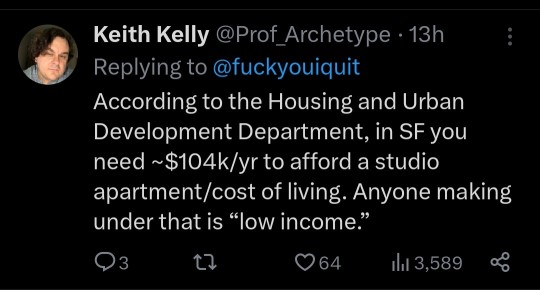
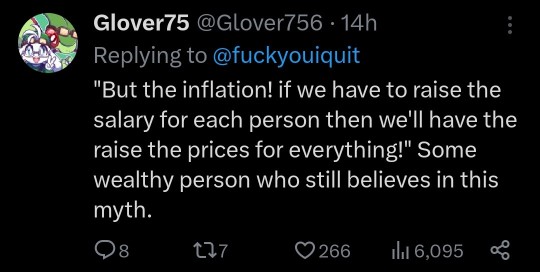
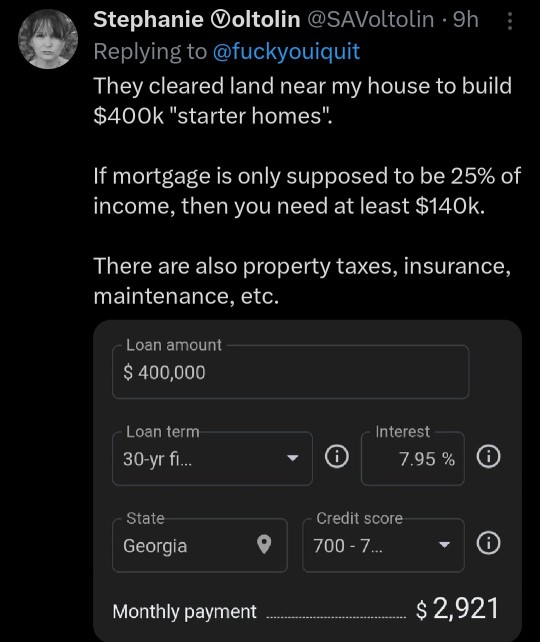
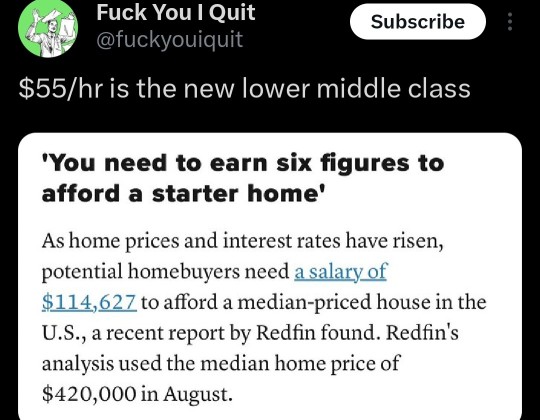

18K notes
·
View notes
Text
Billionaires destroy more than they create
In a land often championed for its economic opportunity and equality, the American Dream promises that anyone who works hard can rise to prosperity. But for many in today’s middle and lower economic classes, that dream is fading, shadowed by a reality that feels increasingly rigged. At the heart of this issue lies a stark and glaring imbalance: billionaires, a minuscule fraction of the population, wield a staggering concentration of wealth and influence. This is not just an issue of economics but one that touches the foundations of democracy and fairness.
Imagine the economy as a massive machine, built to churn wealth throughout society. In an ideal world, this wealth would cycle effectively, where each part contributes and benefits in turn. But as billionaires amass wealth at unprecedented levels, this machine has come to function more like a funnel, siphoning resources from the broader society and concentrating them at the very top. This dynamic, driven by complex financial structures and tax strategies, isn’t merely an accumulation of personal fortunes but a systematic extraction from the economic potential of others. The capital that could have flowed through wages, education, and public infrastructure is often diverted into private bank accounts and shell companies, rarely benefiting the people who drive and build the economy day by day.
As wealth accumulates at the top, so too does political influence. Billionaires, with vast financial resources, can fund political campaigns, lobbyists, and entire networks of think tanks dedicated to shaping policy. Through these channels, they push for tax policies, regulations, and trade agreements that benefit the ultra-wealthy at the expense of middle- and lower-income families. Politicians, indebted to these donors, increasingly look to billionaire interests rather than to constituents’ needs. This creates a disturbing feedback loop: billionaires influence politics to further policies that reinforce their own wealth and power, leaving the broader populace with dwindling opportunities to influence their own government.
This concentrated power extends far beyond campaign finance and lobbying. With ownership over significant segments of media networks, billionaires control the narratives that millions consume daily. Through these media outlets, they shape public opinion, diverting attention from policies that would challenge wealth accumulation and pushing narratives that frame the ultra-wealthy as essential “job creators” or “innovators” rather than acknowledging their role in widening economic divides. Issues that might threaten their economic stranglehold are often buried, while others, that create division and distract, are amplified.
For the middle and lower classes, this confluence of wealth, media, and political power has a real impact. Stagnant wages, diminishing job security, and rising costs of living aren’t natural outcomes of a complex economy—they’re symptoms of a system shaped to benefit those at the top. Policies that could lift working-class Americans, like raising the minimum wage, universal healthcare, or better labor protections, are often stifled in legislative deadlock, thanks in part to the political influence of the ultra-wealthy who stand to lose from them.
So, as this cycle continues, the gap between billionaires and everyone else widens. The billions accumulated at the top no longer signify mere success but a barrier to mobility for everyone else. The middle and lower classes find themselves carrying the economic burdens, often working harder for less. Meanwhile, billionaires remain insulated, living in a different economic reality, one far removed from the struggles of the average American. This isn’t just an economic imbalance but a distortion of democracy itself, as the machinery of power and influence is pulled further from the reach of ordinary citizens and held more tightly by those whose interests rarely align with theirs.
Without addressing this imbalance, the promise of opportunity, the cornerstone of the American Dream, becomes less attainable with each passing year, not just for the lower and middle classes but for the nation’s future as a whole.
Addressing their manipulation
Billionaires and their advocates often employ a familiar set of narratives to justify their wealth and the structures that enable it. These arguments, framed in terms of the free market, capitalism, or fear of socialism, are not only misleading but often serve to distract from the deeper systemic issues at play. Below is a breakdown of these claims and the counterarguments that expose their flaws:
1. “It’s Just the Free Market at Work”
The myth of the “free market” implies that billionaires achieve their wealth purely through talent, innovation, and competition in a market where everyone has equal opportunity. But in reality, the U.S. economy is far from a genuinely “free” market.
Counterpoints:
• Government Subsidies and Tax Breaks: Many billionaires’ businesses rely heavily on taxpayer-funded subsidies, special tax breaks, and other forms of government assistance. Large corporations frequently lobby for policies that grant them tax advantages, including offshore loopholes and capital gains tax breaks. This creates an environment where they aren’t competing on equal ground but rather with significant state support, distorting the market in their favor.
• Anti-Competitive Practices: Many large corporations, especially in tech and finance, engage in monopolistic behavior, buying out competitors or using aggressive tactics to drive them out of the market. This concentration of power stifles competition, contradicting the notion of a “free” market where anyone can succeed if they work hard.
• Inherited Wealth and Privilege: A significant portion of billionaire wealth is inherited rather than self-made. Generational wealth compounds, giving the ultra-wealthy an enormous head start over those without similar family resources. This challenges the idea that wealth accumulation is simply the product of individual merit or a fair market.
2. “This Is What Capitalism Is Supposed to Look Like”
The argument here suggests that capitalism is an inherently competitive system, where the most successful rise to the top, benefiting everyone through innovation and job creation. This narrative hinges on the idea of “trickle-down economics,” where the wealth of the richest eventually spreads throughout society.
Counterpoints:
• Trickle-Down Economics Doesn’t Work: Decades of evidence show that wealth rarely “trickles down” to the rest of society in any meaningful way. Income inequality has only widened, with wages stagnating for most workers while billionaire wealth has soared. Billionaires tend to reinvest wealth in ways that concentrate their holdings, like in stocks, rather than in ways that benefit the broader economy.
• Wealth Extraction, Not Wealth Creation: Many billionaires achieve and maintain their fortunes through rent-seeking behavior—extracting wealth from existing resources rather than creating new value. Hedge funds, private equity, and real estate empires often profit by cutting costs (like labor) rather than by innovating or producing new goods and services. This dynamic benefits investors but hurts workers and consumers.
• Capitalism Can Take Other Forms: The capitalism practiced in the U.S. today, sometimes called “neoliberal capitalism,” focuses on minimal regulation, tax cuts for the wealthy, and privatization. However, other countries demonstrate that capitalism can function with stronger social safety nets, wealth redistribution policies, and tighter regulations on corporate power. Nordic countries, for example, balance capitalism with robust welfare systems, ensuring a more equitable distribution of wealth and services.
3. “Without Billionaires, There Would Be No Innovation or Job Creation”
A popular myth is that billionaires are essential “job creators” and “innovators” whose wealth ultimately benefits society by funding new businesses and creating employment. This claim positions billionaires as indispensable to economic growth.
Counterpoints:
• Public Funding Fuels Innovation: Many of the biggest technological advances, including the internet, GPS, and medical breakthroughs, were developed with public funding rather than billionaire investments. Government research grants and subsidies often lay the groundwork for major innovations that billionaires later profit from. In other words, society bears much of the financial risk, while billionaires reap the rewards.
• Small Businesses Create Most Jobs: Small businesses, not billionaires or large corporations, are responsible for most job creation in the United States. Big corporations often eliminate jobs through automation, outsourcing, or consolidation. They may employ a large workforce, but they also tend to exploit workers through low wages, precarious employment, and cost-cutting measures.
• Billionaires Accumulate Wealth Through Wealth, Not Innovation: Many billionaires maintain their wealth not by creating jobs or innovating but by using their existing capital to generate more wealth, often through financial instruments that have little to do with actual economic productivity. Stock buybacks, dividends, and passive investments grow their fortunes without necessarily contributing to broader economic prosperity.
4. “Any Alternative Is Socialism or Communism”
When calls arise for higher taxes on the wealthy, stricter regulations, or broader social programs, the response is often to invoke the fear of “socialism” or “communism.” This argument seeks to paint any attempt at wealth redistribution or regulation as a slippery slope toward total government control.
Counterpoints:
• Social Safety Nets and Regulations Are Not Socialism: Social safety nets, progressive taxation, and regulations do not equate to socialism or communism; they’re features of a balanced capitalist system that seeks to prevent extreme inequality and protect public welfare. Countries like Germany, Canada, and Denmark combine regulated capitalism with strong social programs, resulting in healthier economies and greater well-being for citizens without abandoning capitalism.
• Inequality Threatens Capitalism: Growing inequality and economic instability can undermine the foundations of capitalism. A healthy capitalist economy requires a strong middle class with buying power, which excessive wealth concentration undermines. Reforms like progressive taxation, labor protections, and universal healthcare aren’t a rejection of capitalism but rather a means of stabilizing it.
• Historical Success of Mixed Economies: Many of the most successful and prosperous countries practice a mixed economy, where capitalism coexists with social policies that promote equality. The U.S. itself has employed a mixed economy model in the past, particularly after the New Deal, which implemented social safety nets, labor protections, and financial regulations that led to a period of unprecedented growth and prosperity for the middle class.
5. “They Earned It Fair and Square”
Finally, the idea persists that billionaires deserve their wealth because they “earned” it. This argument suggests that any policy aiming to redistribute wealth is fundamentally unfair, penalizing those who worked hard to succeed.
Counterpoints:
• Systemic Advantages and Wealth Hoarding: As previously mentioned, many billionaires begin with advantages—like family wealth or elite educational opportunities—that aren’t available to most people. Additionally, billionaires often employ complex strategies to avoid taxes, lobby for favorable regulations, and capitalize on government subsidies. These factors mean they haven’t earned wealth solely through hard work or merit.
• Billionaires Didn’t Build Alone: No billionaire operates in isolation; they rely on infrastructure, public education, and the work of thousands or millions of employees. A CEO’s wealth is made possible by a web of collective contributions, yet that wealth is rarely shared equitably. While billionaires might be rewarded for their role, their fortune is far from the result of individual effort alone.
In short, these narratives around billionaires often mask a more uncomfortable truth: today’s system is structured in ways that favor the ultra-wealthy at the expense of the broader population. Economic reform, rather than a threat to capitalism, is a necessary step to ensure a more just, equitable society where wealth accumulation doesn’t depend on privilege, influence, or systemic manipulation.
Making a change
Addressing the economic imbalance and the unchecked power of the ultra-wealthy presents a unique challenge, especially given the intense political polarization in the United States. For the middle and lower classes to push back effectively, they will need to build a coalition that transcends party lines and focuses on shared economic interests rather than divisive rhetoric.
1. Build Awareness Through Shared Issues, Not Ideology
The rhetoric around “free markets” and “socialism” often obscures real issues of economic struggle that affect both conservative and progressive working- and middle-class citizens alike. Instead of framing the issue in ideological terms, framing it in terms of tangible, shared grievances can help bridge the divide:
• Focus on Economic Inequality: Income stagnation, unaffordable healthcare, and housing insecurity are felt across the political spectrum. By shifting the narrative from “class warfare” to “economic fairness,” advocates can sidestep partisan language and emphasize the shared experience of economic struggle.
• Highlight the Impact of Corporate Power on Local Communities: Framing issues around how large corporations hurt small, local businesses can resonate strongly with both sides of the political spectrum. This approach often taps into conservative values around community and self-reliance, while also aligning with progressive critiques of corporate overreach.
2. Organize Around Labor Rights and Worker Protections
Historically, unions have been instrumental in improving working conditions and advocating for fair wages, and labor movements transcend political divisions. Many Americans—left, right, and center—share concerns about the erosion of workers’ rights, stagnant wages, and the declining influence of the average worker.
• Expand Union Participation and Labor Movements: Reinvigorating unions and expanding labor protections could give workers a stronger collective voice. New labor movements that focus on economic rights without overtly partisan language could attract support across the political spectrum, particularly when they champion issues like fair wages, workplace safety, and job security.
• Support Worker Cooperatives and Employee-Owned Businesses: Promoting models like worker cooperatives or employee-owned businesses can offer a compelling alternative to the current structure of corporate ownership without resorting to divisive rhetoric. These models prioritize local control and shared economic benefits, appealing to values of self-sufficiency and fairness.
3. Pressure Politicians on Key Economic Policies
A key to bridging the partisan gap is to focus on policies that benefit the broader populace rather than framing them as part of any ideological agenda. The majority of Americans, regardless of political affiliation, support policies like fair taxation, healthcare reform, and increased access to education when framed in terms of fairness and opportunity.
• Promote Tax Reform as “Fairness,” Not Redistribution: Instead of advocating for “redistribution,” proponents can push for tax policies that ensure everyone pays their fair share. Policies like a wealth tax or higher taxes on capital gains can be framed as holding the ultra-wealthy accountable rather than demonizing them, a stance that resonates with people who value fairness and personal responsibility.
• Advocate for Antitrust Legislation: Pushing for stronger antitrust laws to break up monopolies and prevent anti-competitive practices can appeal to both sides. For conservatives, this aligns with the values of market competition; for progressives, it aligns with corporate accountability and consumer protection.
4. Engage in Alternative Media and Independent Journalism
The ultra-wealthy often own or influence major media outlets, which can shape public opinion in ways that protect their interests. For the middle and lower classes to gain a clearer view of economic issues, alternative media sources and independent journalism that aren’t beholden to billionaire interests are crucial.
• Support Independent News Outlets: A growing number of independent news organizations are dedicated to in-depth economic reporting without catering to corporate interests. Supporting these outlets allows individuals to access a range of perspectives that help reveal the true impact of policies on ordinary people.
• Utilize Social Media Responsibly to Build Cross-Party Awareness: Social media, while often a divisive force, can also be used to spread information about economic injustice. When used responsibly to share facts, case studies, and stories of economic hardship, it can cut through the rhetoric and provide people across the political spectrum with a shared understanding of the issues.
5. Prioritize Voting Reform and Campaign Finance Reform
Money in politics is one of the core reasons why economic policies favor the wealthy. Bipartisan support for reducing corporate influence in politics is possible, especially when the focus is on fairness, transparency, and accountability in government.
• Promote Campaign Finance Reform as an Anti-Corruption Effort: Campaign finance reform, which seeks to limit the influence of wealthy donors and corporations on elections, can appeal to conservatives and liberals alike who are frustrated with the influence of money in politics. Instead of framing it as an anti-capitalist measure, framing it as an anti-corruption measure can attract broader support.
• Support Voting Reforms for a More Representative Democracy: Reforms like ranked-choice voting, ending gerrymandering, and preventing voter suppression can help create a political environment that more accurately represents the will of the people rather than special interests. By creating a more representative democracy, policies that reflect the economic needs of the middle and lower classes have a better chance of being enacted.
6. Create Cross-Partisan Grassroots Coalitions Focused on Economic Issues
Many grassroots organizations are focused on economic justice, but they tend to align themselves with one side of the political spectrum, often losing potential support in the process. Building cross-partisan coalitions that emphasize shared economic challenges rather than ideological differences could foster stronger, more united advocacy for middle- and working-class issues.
• Organize Around Issues, Not Parties: Groups like the Poor People’s Campaign, which focuses on poverty and economic justice, have successfully united people across political lines around issues that transcend party loyalty. This approach allows people to focus on their shared struggles, making the movement harder for politicians to ignore.
• Build Community-Level Alliances: Many economic issues are felt acutely at the local level. By focusing on community-level initiatives that address healthcare, affordable housing, and education, people can create practical, on-the-ground solutions that don’t require alignment with national politics. These local successes can serve as models for broader change.
7. Emphasize Civic Education on Economic Policies
Finally, bridging the gap will require education and awareness. Many people accept billionaire-fueled rhetoric because they lack exposure to alternative perspectives. Civic education efforts that focus on teaching economic principles, tax policy, and the influence of corporate power can empower people to understand the real impacts of current policies on their lives.
• Create Accessible Educational Resources: Podcasts, documentaries, workshops, and community discussions can all serve as tools for demystifying economic issues. When people have a clearer understanding of how things like tax policies and wage laws work, they are better equipped to make informed decisions.
• Promote Financial Literacy and Empower Individuals: Financial literacy programs that help individuals understand budgeting, credit, and investments empower people to navigate the economy more effectively. While this doesn’t directly address systemic issues, it gives individuals a greater understanding of the forces shaping their lives and can be a first step toward broader engagement.
By approaching these issues with a focus on shared struggles, fairness, and practical solutions, the middle and lower classes can work together to build a movement that transcends political divides. This movement can challenge the status quo without becoming mired in divisive ideological battles. The real strength of such an effort lies in its ability to unite ordinary people around a common vision for a fairer, more just economic system—one that serves all citizens, not just the wealthiest few.
#capitalism#reality#billionaires#middle class#trickle down economics#facts#economy#economics#wealth#ultra wealthy
2K notes
·
View notes
Text
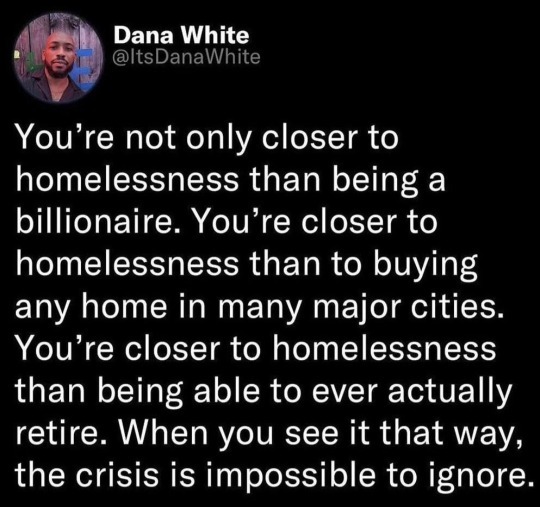
#politics#us politics#progressive#capitalism#homelessness#class war#eat the rich#billionaire#retirement#inequality#wealth inequality#homelessness crisis#poverty#middle class
2K notes
·
View notes
Text
“...people are suffering for imaginary value...”
Wish I saved that Tumblr screenshot.
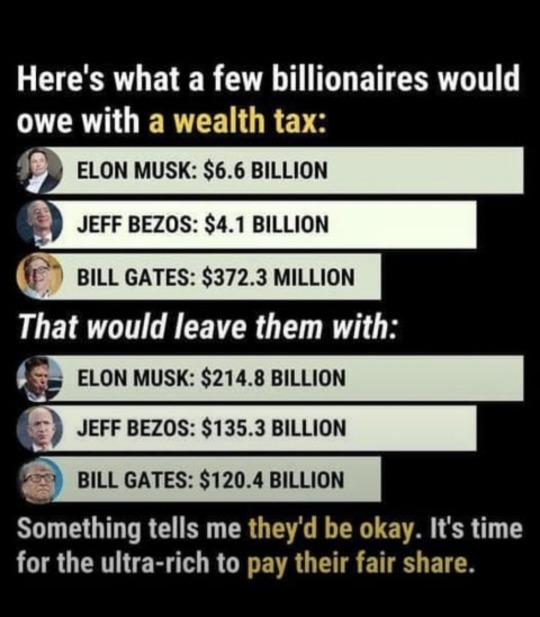
If one were to count to a million, one number per second, it would take, 11 days, 13 hours, 46 minutes and 40 seconds, that is if you continuously count all 11 and half days without rest.
If one were to count to a billion, one number per second, it would take 31.7 years, if you were to count 24 hours a day. Yet if you were undertaking this you’d need to sleep occasionally. If you were to count 16 hours a day, leaving room to sleep, it would take you roughly 48 years.
There’s a thousand millions in a billion, a million millions in a trillion, a thousand billions in a trillion.
There was a point in time where both Bezzos and musk net worth was nearly a trillion dollars. If they wanted to count just one billion of those dollars by hand it would take them 48 years to accomplish.
Elon musk makes $8 million a day from government subsidies, this is prior to him eliminating any competitors from the inside with doge. The average senior, who busted their butts for 50 years paying into their social security, Medicare, state and federal taxes, makes $65 a day.
The absurdity of it all is staggering. That these men who found their niche in business, bezzos with an online bookstore, right as the internet was taking off, and musk who’s father exploited black South Africans in his jewel mines, gave Elon the capital to invest in PayPal, to which he sold, bought an existing electric car company, used the carbon credits, and federal incentives, to make hundreds of billions of dollars, both pay the bare minimum in taxes, with Tesla paying nothing 3 out of the last 5 years. You and I, people who sometimes have to scrounge change to put gas in the tank, who struggle to pay for housing, groceries, insurance, try to enjoy life, we pay almost 40% of our income to taxes, social security and Medicare/medicaid.
How the f*ck is that acceptable!? Let alone celebrated?! You think these ultra rich know what it’s like to have to make decisions on whether hey can afford lunch or if that needs to go into the gas tank to get to work to pay to live?! WTF?!
Greed, selfishness, arrogance, these are the fuel that feeds the fire that leaves the middle class stuck, struggling and frustrated. But they have convinced so many that it’s the political opposition that is the cause of their inability to get ahead, or immigrants, of people of color, or trans people, gay people, stoking division to continue hoarding wealth like some sick addiction.
There’s not an infinite amount of capital in the U.S. economy. There’s only X amount. If these greedy robber barons stockpile the majority of it, that leaves a minuscule amount for the rest.
24 hours a day counting one number per second, it would take 32 years to count 1/200 of Bezzos and musk’s fortune.
TAX THE RICH!!!!
#elon musk#doge#social security#jeff bezos#blue origin#donald trump#Tesla#politics#oligarchy#brolargarchy#maga#maga 2024#trump is a threat to democracy#traitor trump#republicans#democracy#news#no kings#impeach trump#middle class
2K notes
·
View notes
Text
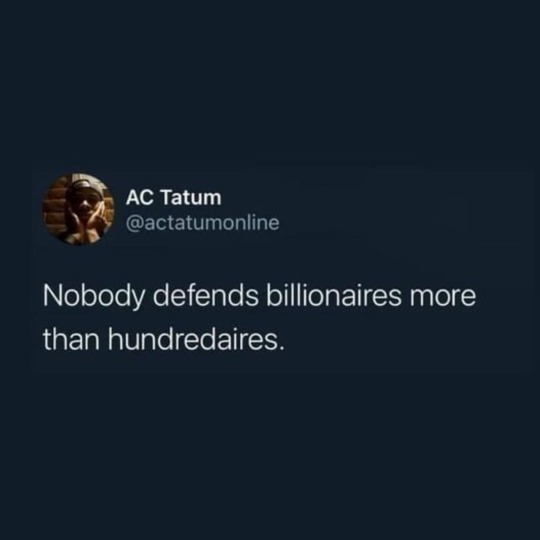
Nobody defends billionaires more than hundredaires.
#Nobody defends billionaires more than hundredaires.#billionaires#oligarchy#corporate greed#anti capitalism#neoliberal capitalism#late stage capitalism#stockholm syndrome#us politics#class consciousness#class war#deny defend depose#eat the rich#luigi mangione#french revolution#resistance#rage against the machine#ddd#revolution#working class#middle class
358 notes
·
View notes
Text
Thanks, ‘Merica!
#tariffs#tariff war#china#united states#America#Trump#president trump#MAGA#trade war#oligarchy#billionaires#middle class#manifacturing#Neil#tiktok#grumpy Chinese guy#revolution#stock market manipulation#rigged system#american government#greed
192 notes
·
View notes
Text
She's fired up! As we all should be!
#us politics#middle class#poverty#corporate greed#fed up#fed up with everything#trump#elon musk#politics
166 notes
·
View notes
Text


art by @martharich63 on insta
#economic#politics#us politics#political#donald trump#news#president trump#elon musk#american politics#jd vance#buying power#middle class wealth#middle class#money#authoritarianism#government#us news#financial blackout
236 notes
·
View notes
Text
"The financial media site Investopedia has done the math and calculated that achieving those milestones now costs a staggering $4.4 million—over $1 million more than most Americans will make in their lifetime, according to the researcher."
#quote of the day#american dream#millionaire#billionaire#money#greed#taxes#tax#us government#anti capitalism#capitalism#home#house#realestate#rich#poor#middle class#economy#lower class#dream#job#work#career#employment
165 notes
·
View notes
Text
Born to write in aesthetic diaries and leather notebooks...forced to journal in LIC wali diary
(middle class majak)
#middle class#LIC ki diary#gareebi#desi tumblr#desiblr#desi tag#siyakasila#desi girl#desi core#journaling
390 notes
·
View notes
Text

Life is so bad I pull out the mr. Incredible meme
#girlblogging#gen z#meme#middle class#millenials#tumblr memes#meme humor#dank memes#memedaddy#funny memes#funny shit#funny stuff#funny jokes#funny#funny humor#funny post#humour#dark humor#humor#finance#education#college#im broke#sad thoughts#class struggle#this is a joke#anti capitalism#this is what makes us girls#us politics#life is shit
49 notes
·
View notes
Text
Class consciousness
#class consciousness#eat the 1%#eat the fucking rich#eat the rich#fuck amazon#fuck mark zuckerberg#fuck america#fuck ice#guillotine#socialism#leftists#karl marx#politics#fuck trump#fuck elon musk#fuck meta#class war#riot and protests#start a riot#i stand with palestine#lower class#middle class#the 1%#blm#political blog#dump trump
58 notes
·
View notes
Text



Liebestraum No. 3
synopsis Eighteen year old Y/n, the daughter of two accomplished musicians, spends her summers surrounded by aspiring artists in her father’s prestigious program. Among them is Heeseung, a quiet, talented pianist who captivates Y/n with his reserved nature and mysterious charm. Amid the music, family expectations, and unspoken feelings, Y/n must navigate her growing affection for Heeseung and decide what she truly wants for her future—and her heart.
word count 2k+
contains fluff, summer love, rivals to lovers, teenagers in love, eventual smut (in the next chapters), comfort, heeseung x reader, slow burn
author’s note hi guys! this is my first post and first time writing something like this~ english is not my main language so there might be errors! i wish to make this a series with an eventual time skip to make things more interesting <3 i hope you like it^^
chapter 1
Your fingers softly brushed through the black and white tiles, like a ballerina spinning rapidly on her pointy shoes. They danced, at times increasing their speed, hungrier and expectant for the next one, until the running stopped.
Your right hand played a single-note melody, while the left one sustained a long, flowing chord. Your fingers were delicate now, more careful as if you were too scared to touch the piano, or it might break into million pieces.
“Incredible! Truly stunning, my dear!”
You didn’t notice your mother entering the studio with a satisfied look on her face, making you suddenly aware of your surroundings, while turning to look at her.
“Oh my, mom! I told you not to startle me when I practice!”
Your parents loved to brag about you with the rest of your family and friends. You knew you were good, but you were a perfectionist and always aimed for more.
“What can I say, you are indeed your father’s child…besides, dinner is ready and tomorrow is an important day~” she said with a sweet tone, still looking more serious, reminding you of your duties.
You know what was next, you wouldn’t have the room just for yourself. The blinds would finally be shut open, welcoming the light from the sun that would soon illuminate the big wooden piano in the center of the room. The pillows of the sofa and most books from the library would be scattered around and the little glass table in front of it would have pastries and beverages ready for everyone, while your father would begin to explain the summer program to his students.
You were used to this, it wasn’t really a big deal to you.
For almost three years your father had been welcoming his most privileged pupils to hold private lessons for them, preparing them to enter the prestigious conservatory in your city, which your eighteen year old self was expectant to attend.
Most students returned each summer, some aimed to enter the academy but still came for extra practice. This is actually how you met your current best friend, Jungwon.
His cheerful personality made it easy for you to get along with him. He was a bit of a prankster and sooner or later, you two found yourselves running around the tight colored alleys of the countryside, under the hot sun of the summer.
“Y/n wait!”
“Come on, Jungwon! Are you really scared of a little water??” You said, wetting him with a hose you found on a nearby garden.
“What are you saying?? I’m completely soaked! Your mom will kill us if we enter the house like this!”
Your eyes suddenly widened.
Oh my god. The music sheets.
Screw the water, you were supposed to keep them completely safe and now they were most likely wet and-
Jungwon started laughing at your shocked expression. Making his way to his backpack, he quickly took the precious dry and brand-new looking sheets out, holding them in his hand.
“You looking for these?” He smirked with an entertained look in his face.
“Give me those! Oh my God, Jungwon I almost died!”
“You’re such a drama queen!” He laughed, running away from you.
You two were actually pretty similar. Even though he was younger, there was a sparkle of responsibility in his behavior that often made you come to your senses. You could always count on him, that’s why most of the time you confessed your cheesy teenage stories and dreams to each other, whether it was an awkward situation or a romantic interest, like the big crush you had on Lee Heeseung.
Well, you still didn’t know yet.
Your first impression of Heeseung was that he was pretty shy. You were introverted yourself, but he wasn’t much of a talker—for some reason, that made you curious and at times, you would act bratty around him. You knew this wasn’t the best way to approach him, but you felt like that was the only way to get close to him…as if that made any sense.
Like you, he was considered pretty talented: the boy had a perfect pitch and he could play both the piano and the guitar. Despite his age, he was a bit taller than you and you couldn’t help but notice his big brown eyes scanning the studio, before entering each time.
Did he see me staring?—you’d think, quickly gazing away from him when his eyes met yours.
He was magnetic and you couldn’t resist, but you always wondered where your sudden curiosity for him came from.
What’s your deepest meaning for music, Lee Heeseung?
Can I share my secrets with you?
Why don’t you talk to me?
It wasn’t easy for him to break his shell either.
One night, you were all seated around the big table outside the house, a plastic cloth on it and half a watermelon cut into portions for everyone to eat. The air was humid and salty, as if the sea wasn’t so far from the porch. After a nice dinner, your parents left soon to sleep, so you were chatting under the starry night.
“I didn’t think you’d come back this year as well, Hoon. ” Jungwon asked, shuffling some cards between his fingers.
Sunghoon stretched on the chair with his arms behind his head. “Yeah well, my parents think my sister still needs some practice before she’ll get used to the conservatory,” he said, turning to look at you. “So i thought I’d come to say hi again...”
You instinctively blushed and looked down at your hands. There was always some sort of connection between you two. He was the child of two talented musicians, so him and his sister would often spend their summer at the studio.
“My parents always have a plan for everything…” he admitted, for a moment lost in his thoughts. You knew what he meant.
“Sounds like you’ve got your whole life mapped out…does it ever get old?” Jungwon sighed with a knowing look.
Despite your talent, sometimes you wondered if your passion really did come from a deep interest or rather you were supposed to like it, because that is how things went for you.
On the other side of the table, Heeseung was listening to the conversation while taking a bite out of his gelato. With him hanging around this time, those thoughts weren’t so rare. You turned your head to look at him. How was he always so calm about everything? Could he feel any emotion at all?
“Oh, Heeseung!“ Jungwon’s voice interrupted your thoughts. “I saw your recital last year!”
Liebestraum No. 3.
You remember Jungwon telling you about a performance that made him feel shivers all over his body. He was always the empathetic type, but he’s never had this kind of reaction for anything else before. He could almost feel everything around him transforming, Heeseeung’s figure in the middle of a moonlit garden. White lilies shimmering under the sky, the chilly air making them move at a slow pace.
“Seriously, how do you play like this without getting nervous?”
Not knowing how to take the compliment, Heeseung shifted uncomfortably in his chair, but smiled softly with a light flush on his cheeks.
So he wasn’t a robot?
You started to get annoyed at the idea that you never got to see his most vulnerable side. Sure, you could hear him playing in the studio sometimes, but it wasn’t the same thing.
A dry chuckle escaped your mouth.
“You make it sound so easy…” You murmur.
You didn’t want to be rude and knew that your comment was out of place. Immediately you shut your mouth.
“I-“ Your eyes widening.
Everybody’s attention was on you now, which you hated. Heeseung’s expression was once again unreadable.
“I’m going to bed.” You got up out of embarrassment and headed quickly to your room. Jungwon rushing behind you, but you ran faster up the stairs, until his voice calling you was long gone.
The sound of the waves filled up Heeseung’s ears. His pants were rolled up so the water on the shore wouldn’t wet them. Some clouds starting to prepare the sky for the rain. He liked the quiet, but often blamed himself for not stepping up at the right time. It wasn’t just his personality, Heeseung could be bold if he wanted to, he just preferred to observe from time to time.
Suddenly he heard your voice from afar. “Aren’t you coming to practice today? My dad has been looking for you everywhere…”
“I thought you didn’t want to see me?”
“Really? You barely ever spoke to me and that’s the first thing that comes to your mind?”
He took a step closer to you. His feet shifting the hot sand.
Standing in front of him you realized how tall he actually was. Some of his hair strands moved with the light wind and covered bits of his face. You felt your breath quicken as you tried to avoid his gaze.
He held out his hand to you.
“What?”
“Let’s try this again. Give me your hand please.” You freeze. “Uhm..”
“Come on…” He insisted. His eyebrows raising.
You reluctantly reached out, looking at him with squinted eyes, unsure of his intentions. He gently took your hand and kissed the back of it, leaning forward slightly.
You quickly got away from his hold.
“…Wh- What do you think you’re doing??”
His confidence suddenly gone as you noticed his ears getting red.
“I’m sorry. I-…I don’t know how to talk to you.” he admitted, fidgeting with the hem of his shirt.
“You look…so dumb right now. ” you chuckled at his embarrassment, almost laughing.
“I know, I just didn’t want to make you uncomfortable last night.” His eyes softening and looking more sincere.
You didn’t think he did. It was more like you acted out of jealousy and you only blamed yourself for that.
You cleared your throat, not wanting to remember what happened. “Uhm…do you want to get away from here? I’m sure my dad wouldn’t mind for today.” You lied, but Heeseung seemed chattier than usual so it was worth it. He was surprised at your statement but still nodded slowly. A big smile printed on his face.
It was almost evening and the sun was setting already. Everybody was getting ready for dinner, so you could feel the lights from inside the houses illuminating the streets of the village.
After walking for a while you reached a swing on a nearby park, Heeseung following you with an amused look on his face.
He was now standing in front of you. “What are you, ten?” a mocking tone in his voice.
You rolled your eyes and shot him a look. “You’re so boring…” You stuck out your tongue at him, a grin pulling at your lips. “Come on, push me.”
Heeseung chuckled, taking his hands out of his pockets.
“You’re older than me and yet, here you are, swinging your legs like a little kid…”
Besides his provocative comment, he stood behind you, pushing you from your back. He watched as the chilly wind brushed your hair away from your face, softly tickling his hands each time he touched you. He was as delicate as possible and found himself staring at the way your sundress perfectly hugged your lower waist. The ends of it moving back and forth with the swing and, as you got closer, he could almost taste the sweet strawberry scent of the lollipop you held in your hand.
Heeseung was intoxicated by you, and of course he blamed it all on his feverish teenage hormones. Things were still pretty awkward between you two, but right at that moment he felt bolder than usual. He pushed you again — once, then twice, and then a third time. You began to feel the swing slowing down, coming to a stop with a quiet creak. You glanced back at him, a confused frown tugging at your brows, only to freeze as his hand moved toward you.
Heeseung’s touch was careful at first, but it sent a jolt through you when his finger brushed down your exposed spine. You inhaled sharply, suddenly aware of the way your chest was rising and falling. He moved slowly, deliberately, his fingers tracing the line of your back with a tenderness you hadn’t expected. The cool rain, which had started to drizzle, landed softly on your skin, but it was nothing compared to the heat that suddenly bloomed in your chest.
The touch lingered a little too long, his finger pressing gently into the curve of your lower back, making it hard to breathe. Everything around you seemed to blur, the sound of the rain mingling with the racing of your heartbeat. You couldn’t tell whether it was the rain or his touch that had made your skin shiver.
Then, just as quickly as it had started, he withdrew his hand, the sudden absence of his touch making you stand up, as though snapping yourself from a trance.
Turning around you noticed your drenched clothes. Your eyes widened as both of you realized how your parents would have eventually reacted if they saw you entering the house like this.
“We should head back.” You said.
Heeseung nodded at you with a soft smile, amused by your alerted reaction. Feeling the adrenaline rushing through his body, he started running and you followed him. You both were breathless, maybe because of your race, or maybe because of what had happened minutes before.
Reaching your house and not wanting to get caught, you exchanged a look with Jungwon who saw you from the window of the kitchen. His eyes widening. “What the…Get inside quickly!” He opened the porch door and let you in.
“Y/n you’re lucky nobody’s here! Where were you all day?? Go wash up before your mom comes back!”
You quickly ran upstairs, the sound of your wet footsteps echoing through the hallway, your heart still racing from the close call. You had barely made it inside before your mother could catch you drenched, and a wave of relief washed over you. You shut the bathroom door behind you, leaning against it for a moment to catch your breath. Heeseung’s touch, his hesitant smile, the way he looked at you like you were the only thing that mattered in that moment.
It had been too much, too fast, but you couldn’t deny the rush it left behind. You splashed your face with cold water, hoping to clear your head. You didn’t understand him yet, not fully. But somehow, you had a feeling you were about to.
to be continued…
#heeseung#summer love#enhypen#enhypen ff#teenagers in love#middle class#conservatory#heeseung smut#eventual smut#music#poetry#heeseung ff#literature#aestheitc#yang jungwon#lee heeseung#lee heeseung x reader#fanfiction#smut#comfort#enemies to lovers#enemies to friends to lovers
49 notes
·
View notes
Text
Bach is like A.I. generated Christian music- so perfectly boring and masculine
If I want pure cold mathematical pedantic precision in my music with a dose of classist religious dogma that means absolutely nothing to my pagan agnostic self? Then I listen to Bach, or to music that's been generated by A.I. programs.
But if I want to hear imperfect organic humanity with soul, philosophy, and emotion? Then I literally listen to everything else, starting with Mozart and Beethoven.
Give me the jubilant masonic symbolist melodies of Mozart or the enlightened motifs of Beethoven any day over the tired old "spiritual" soulless drivel of pathetic nymphomaniac hypocrites like Bach. I can hear his hypocrisy in every dull counterpointed note, and it makes me want to vomit.
As a woman, Bach's overly androidal output makes me sick to my stomach with its subtle toxic masculinity reeking in every bar and measure, as if my ears were being raped by a stupefied drunk. Genius? More like anti-intellectual, anti-emotional pissant garbage fed to the bourgeoisie so they can feel superior to American peasants who'd rather listen to Johnny Cash or The Beatles.
When I hear Mozart and Beethoven, I almost believe in a Heaven and in the possibility of a Higher Power. Their emotional feminine touch is part of what makes their music absolutely beautiful.
But when I hear a fugue, goldberg variation, or choral by Bach? All I hear is mediocre apathetic A.I. generated hell- a pedantic male hell that makes me want to convert to androgynous atheism out of spite.
#juno#jay juno#artist#america#united states#composer#musician#music production#songwriter#bach#music#classical#classical music#mozart#beethoven#counterpoint#thoughts#feminist#women#feminism#classism#class#middle class#bourgeoisie#freemasonry#toxic masculinity#sexism#patriarchy#polemic#rant
32 notes
·
View notes